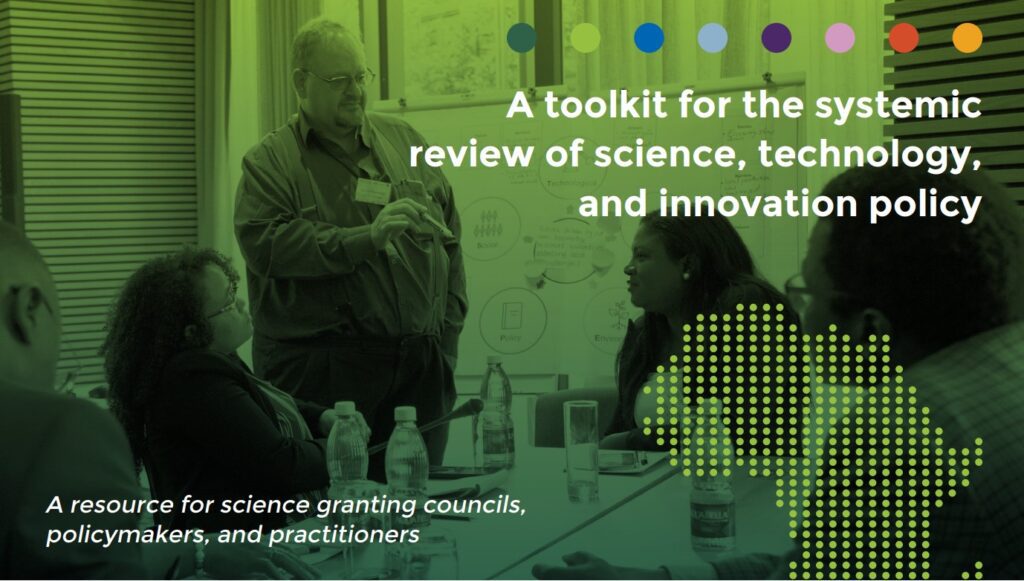The Evi-Pol Toolkit for the Systemic Review of Science, Technology, and Innovation Policy is a practical resource. It is made to support African science granting councils and policymakers in conducting…
The Evi-Pol Toolkit for the Systemic Review of Science, Technology, and Innovation Policy is a practical resource. It is made to support African science granting councils and policymakers in conducting comprehensive, evidence-informed reviews of national STI policies. Produced as part of the Evi-Pol project under SGCI Phase II, the toolkit reflects a participatory approach to policy strengthening across sub-Saharan Africa.

Background of the science, technology, and innovation review
Launched under the Science Granting Councils Initiative (SGCI), the Evi-Pol project aimed to enhance the use of evidence in STI policy decision making. The African Centre for Technology Studies (ACTS), with partners CeSTII and UCAD coordinated the initiative. It sought to equip councils with practical tools, processes, and frameworks through collaborative and consultative technical support. Consequently, the team produced a toolkit based in the realities of African innovation systems. This was shaped through workshops, peer learning, and expert consultation.
Why a Systemic STI Policy Review Toolkit?
African countries increasingly align their STI policies with development agendas such as the Sustainable Development Goals (SDGs) and the African Union’s Agenda 2063. However, many continue to face a significant challenge due to the absence of context-specific, empirically formed tools for policy review. Too often, countries adopt STI frameworks borrowed from more advanced economies, failing to tailor them to their locality.
Explicitly, the Evi-Pol toolkit addresses this gap by offering curated practices and templates that reflect African policy realities. It therefore enables councils and governments to assess STI policy aligned across national, regional, and global development priorities and within the national systems of innovation (NSI).
Key Lenses and Practices
The toolkit is structured around three analytical lenses and four interrelated practices:
Lenses
- Collective Framing and Visioning: Encourages inclusive stakeholder engagement to define shared vision and change pathways.
- Alignment with Development Priorities: Assesses the clarity of STI policy across various sectors and levels of government.
- Alignment within the NSI: Examines systemic coordination and institutional capacities to support STI policy objectives.
Practices
- STEEP Analysis: This analysis Analyses Social, Technological, Economic, Environmental, and Political factors to frame STI challenges and opportunities.
- Challenge-led Policy Road Mapping: Uses back-casting techniques to envision a desired future and identify policy pathways.
- Assessing Vertical and Horizontal Alignment: Builds a structured database of policy instruments to examine coherence across policy actors and levels.
- SWOT Analysis of the NSI: Evaluates strengths, weaknesses, opportunities, and threats across the innovation ecosystem.
Thus, each practice is supported by editable templates and step-by-step guides, allowing users to customise the tools to their specific contexts.
Application and Impact
Designed with modular flexibility, the toolkit can be used at different stages of the STI policy cycle. This includes agenda setting, formulation, implementation, or evaluation. It also supports participatory processes that promote stakeholder buy-in and increase the likelihood of effective and inclusive policy outcomes.
Already tested with multiple councils the toolkit has proven valuable in identifying gaps, improving policy alignment, and fostering evidence-informed policymaking.
Summary
The Evi-Pol STI Policy Review Toolkit empowers African science granting councils and their partners to take ownership of their STI agendas. Fostering inclusive, evidence-based, and context-aware policymaking contributes to stronger, more resilient national innovation systems across the continent.
Themes
The SGCI aims to strengthen the capacities of these SGCs to support research and evidence-based policies that will contribute to economic and social development.

